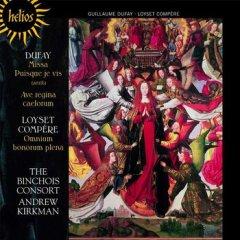Dufay - Missa Puisque Je Vis / Compère - Omnium Bonorum Plena (2013)
Dufay - Missa Puisque Je Vis / Compère - Omnium Bonorum Plena (2013)

Guillaume Dufay Missa Puisque je vis 01. Kyrie (5:14) 02. Gloria (6:29) 03. Credo (8:34) 04. Sanctus (5:27) 05. Benedictus (3:00) 06. Agnus Dei (5:54) Loyset Compère 07. Omnium bonorum plena (10:32) Anonymous 08. Concede nobis, Domine (7:18) 09. Salve maris stella (7:57) Guillaume Dufay 10. Ave regina caelorum (7:50) The Binchois Consort Andrew Kirkman – conductor
This recording contains the Missa Puisque je vis, almost certainly by Dufay, and Compère’s Omnium bonorum plena written in praise of the Virgin Mary, as well as motets by Dufay and other sources, all of which help colour our increasing awareness of the florid richness and emotional devotion of music before Baroque, till recently the starting point of most people’s awareness of the art. Characteristics of Dufay are his intricate workmanship and the development of independent balance among the vocal parts that lead us naturally to the satisfying clarity which has itself given old music a strangely contemporary feel.
The Binchois Consort, under their founder Andrew Kirkman, has a special affinity with the music of Dufay, for it was to perform Dufay that the ensemble was initially founded. That first outing formed the basis of their continuing award-winning exploration on Hyperion of 15th-century music, in particular the worlds of French and English music during the so-called Burgundian period. ---hyperion-records.co.uk
Whether or not the Missa Puisque je vis was in fact written by Guillaume Dufay (a matter of some serious debate), its sublime sonorities and masterfully spun and seamlessly integrated lines are convincing enough, and the eight male voices of the Binchois Consort imbue it with such warm, vibrant sound, allowing its rhythms and phrases their natural-as-breathing flow, that we listeners can be perfectly happy no matter who was its author. We do know that Dufay composed the motet Ave regina celorum, the piece that closes this program, and it is one of the most exquisite works of 15th-century vocal music, the composer's "personal invocation to the Virgin" that he requested "be sung by the choirboys and three men" at his death. Certainly, anyone who heard this would have been moved by its compelling melodic beauty and the poignancy of the harmonic writing, with its moments of striking major/minor contrasts.
The disc is completed by three motets, two anonymous and the third an interesting work by Loyset Compère. The latter is based on a secular song, but its text is an entreaty to the Virgin, a prayer "for the salvation of those who sing." Several such figures are mentioned by name, including Dufay, Busnois, Ockeghem, and Des Pres, with a final plea for Compère himself. Again, the music's expressive beauty makes a powerful effect, employing varied textures, opulent harmonies, and often lively rhythms. The singing is uniformly excellent, characterized not only by purity of tone and clarity of lines, but by the rich and complex colors produced by the combined voices. Hyperion's sound, from London's renowned All Saints, Tooting church, couldn't be better.---David Vernier, ClassicsToday.com
download (mp3 @320 kbs):
yandex mediafire uloz.to mega 4shared cloudmailru gett








